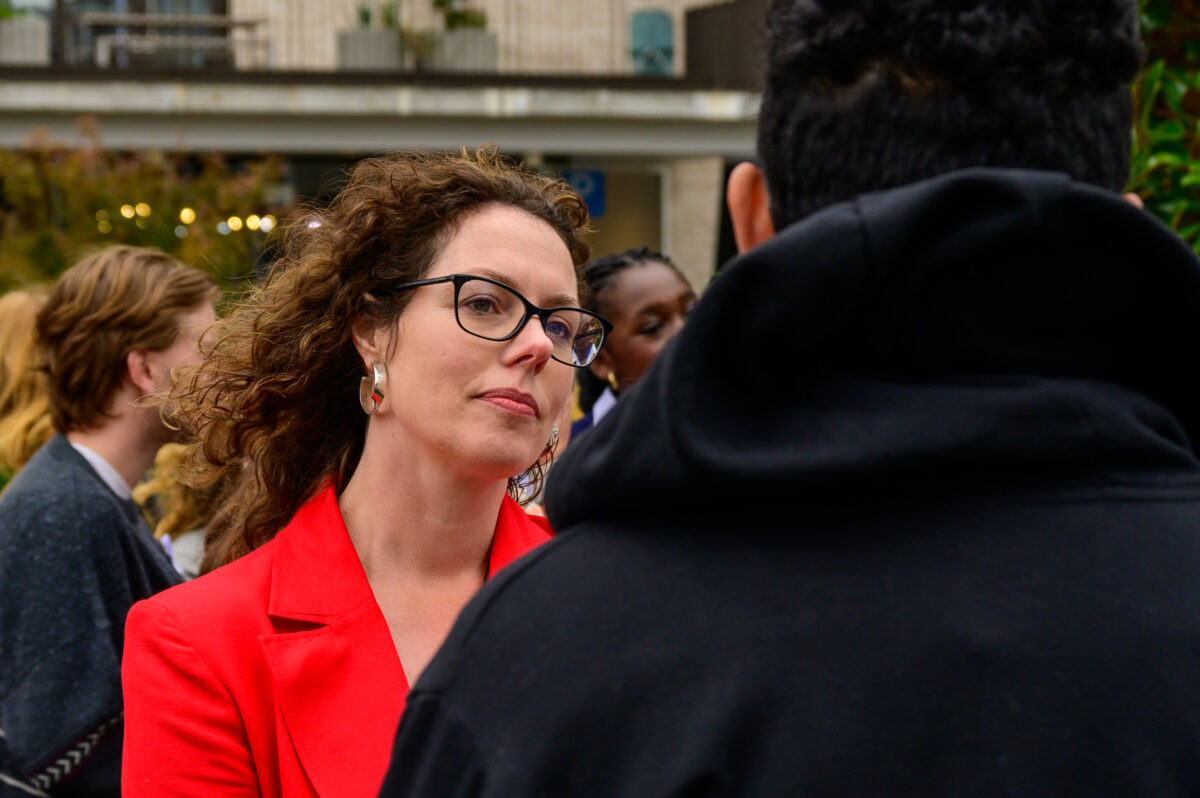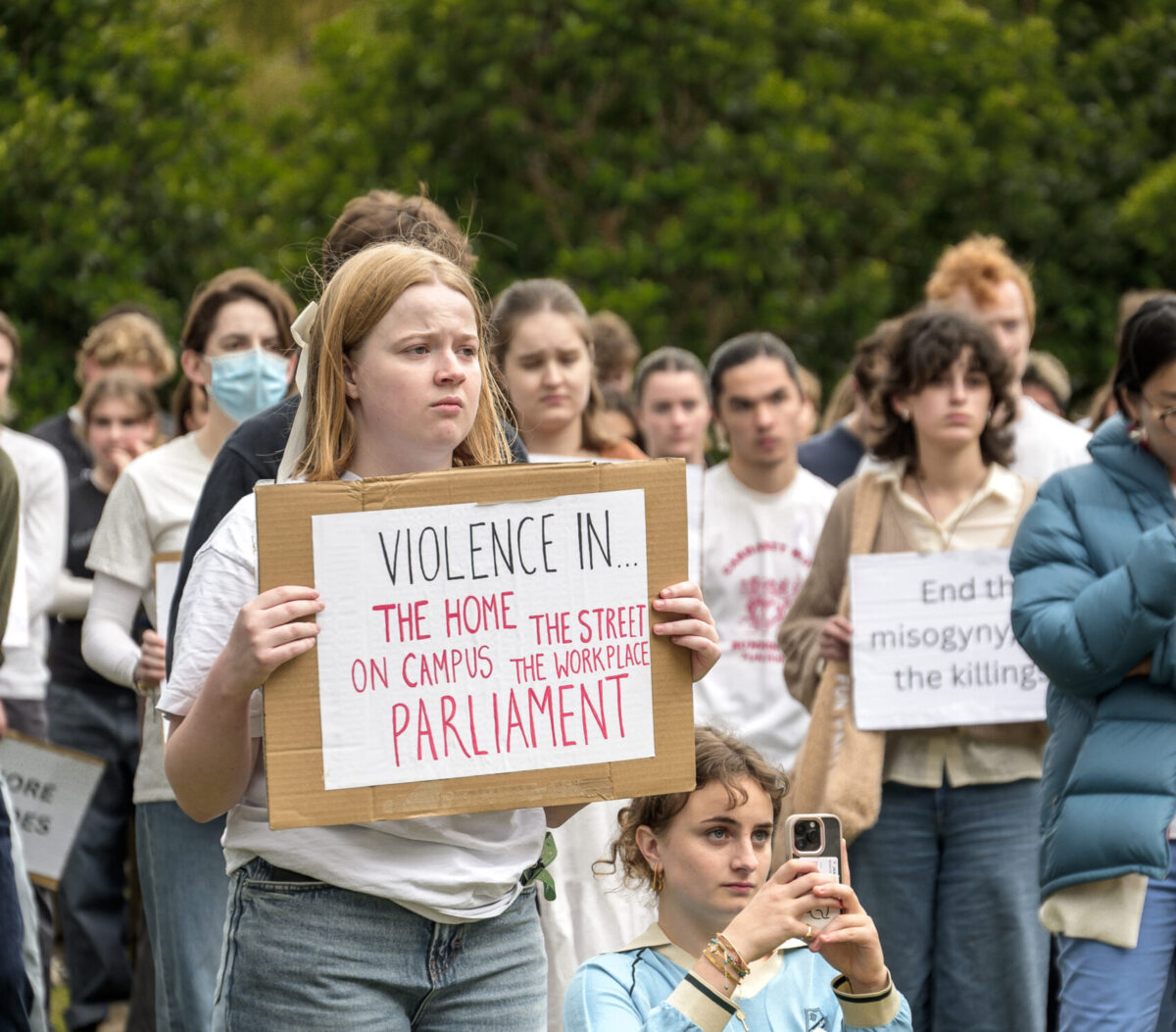Last week on 30 April, over 100 students rallied to bring awareness to violence against women and the ongoing occurrence of femicide in Australia. The rally was held by the ‘Vote4Her Campaign’, whose goal is to shed political light on femicide unfolding across Australia.
Vote4Her describes itself as a “non-partisan campaign to stop the epidemic of the murder of women.” 127 women have been killed since the start of last year, with 24 of them just within the last five months.
The group told Woroni they formed when Mivy, one of their members, found that a 19-year-old girl from her hometown “was killed on the street by a man she did not know”. The 19-year-old was Audrey Griffin from the Central Coast, killed by a 53 year old who was charged days later with murder, alongside 11 unrelated domestic violence charges.
Vote4Her continued, “As young women growing up in the world, we could all relate to feeling disrespected and degraded; made to feel that by simply existing as a woman, we should be afraid for our safety.”
The goal of its campaign was to get “everyone to Vote4Her — vote for the women who’ve been killed, for the communities who are grieving, for the women in your life who could be killed next.”
Research from The Australian Institute of Health and Welfare found one in four women experienced “physical and/or sexual violence from an intimate partner since the age of 15.” The figure for men was 1 in 14; around 70 percent lower than that for women.
Speakers at the rally emphasised the urgent need for political action to address gender based violence, and to hold men accountable for violence against women.
A 2024 report from the World Bank found that only 29 out of 190 countries they measured had legislated explicitly on femicide. Australia is part of the majority that does not have any specific legislation on femicide.
One of the speakers said, “The rise of influencers who blatantly disregard women as humans are feeding their hatred into the younger generation of men before they can form their own opinions about women, and it can be done so discreetly through social media.”
Students weren’t the only ones in attendance at the rally, with political figures from across the spectrum also present; including Senator David Pocock, MP Alicia Payne, and Liberal candidate Will Roche. At the end of the speeches, students were told to go through your crowd, and talk to them [politicians], stating they’re “here to represent you, so go talk to them about how they can help them.”
ANUSA Women’s Department Officer, Jade Poulton, told Woroni, “the amount of women whose lives have been lost due to gendered violence and domestic violence” was “sickening” and “[the Women’s Department] stands in solidarity with everyone impacted today and with all women who will ever be impacted by such a hard, pressing issue.”
A 2017 report by the Australian Human Rights Commission ranked the ANU worst for incidents of sexual harassment and second worst for sexual assault among Australian universities. Four years later, the 2021 National Student Safety Survey confirmed that sexual assault and sexual harassment (SASH) remained prevalent, with ANU ranking second-highest nationally for SASH.
Around 38 percent of ANU students live on the Acton campus, the highest percentage of students on campus in Australia.
The Women’s department holds a yearly August 1st campaign “demanding the ANU to take more action” against SASH due to the “institutional betrayal that continues to be felt by women across campus.”
A post on the August 1st campaign stated that this was a day to, “Protest the university’s shamefully high rates of SASH and the cultures of misogyny, classism, racism, queerphobia, transphobia, and ableism that enable it, and to demand trauma-informed and victim-centred procedures and policies at the ANU.”
Steps Forward
Vote4Her told Woroni that this rally was only the beginning of the movement, as “the more people who engage, the more power and influence we have to change the culture within Australia.”
The group believes that the government should use both ‘soft’ and ‘hard’ power to direct public conversation, improve support for women and children facing violence by building more safe housing, criminalise femicide, keep repeat offenders off the streets, fund programs for young men, support frontline services, and invest more in the National Plan to End Gender Based Violence.
Woroni spoke to Labor MP Alica Payne about what her and the Labor government had done to address the problem of violence against women. While Payne acknowledged that there was more her government could do, she admitted the existence of a “deep-rooted cultural issue of violence against women in Australia”.

She continued that she was “proud to be part of a government that has committed to end domestic violence against women and children” and has “invested over $4 billion into that in a range of different policies, from prevention and education in schools through to paid domestic violence leave for all Australian workers.”
Poulton emphasised that it was important to “Look after yourself, your friends, and reach out to support where you need it … As even if you’re not a victim of gendered or domestic violence … hearing statistics on days like this can be really triggering.”
If you or anyone you know is affected by the content of this piece, please contact one of the support services below:
ANU Women’s Department: sa.womens@anu.edu.au
Domestic Violence Crisis Service: (02) 6280 0900, 24/7 (ACT).
1800 Respect: 1800 737 732, 24/7 (National).
Canberra Rape Crisis Centre: (02) 6247 2525, 7am-11pm, 7 days a week.
13YARN: 13 92 76, 24/7. Culturally safe support for Aboriginal and Torres Strait Islander.
QLife: 1800 184 527, 3pm-midnight. Support and referral for LGBTQIA+ people.
Lifeline: 13 11 14, 24/7.
ANU Student Safety and Wellbeing Team (+ Case Managers)
Email: student.wellbeing@anu.edu.au
Phone: 6125 2211, or visit the
Health and Wellbeing Centre
Level 3, Building 156 Joplin Lane, Kambri (9-4pm Mon-Fri).
We acknowledge the Ngunnawal and Ngambri people, who are the Traditional Custodians of the land on which Woroni, Woroni Radio and Woroni TV are created, edited, published, printed and distributed. We pay our respects to Elders past and present. We acknowledge that the name Woroni was taken from the Wadi Wadi Nation without permission, and we are striving to do better for future reconciliation.
